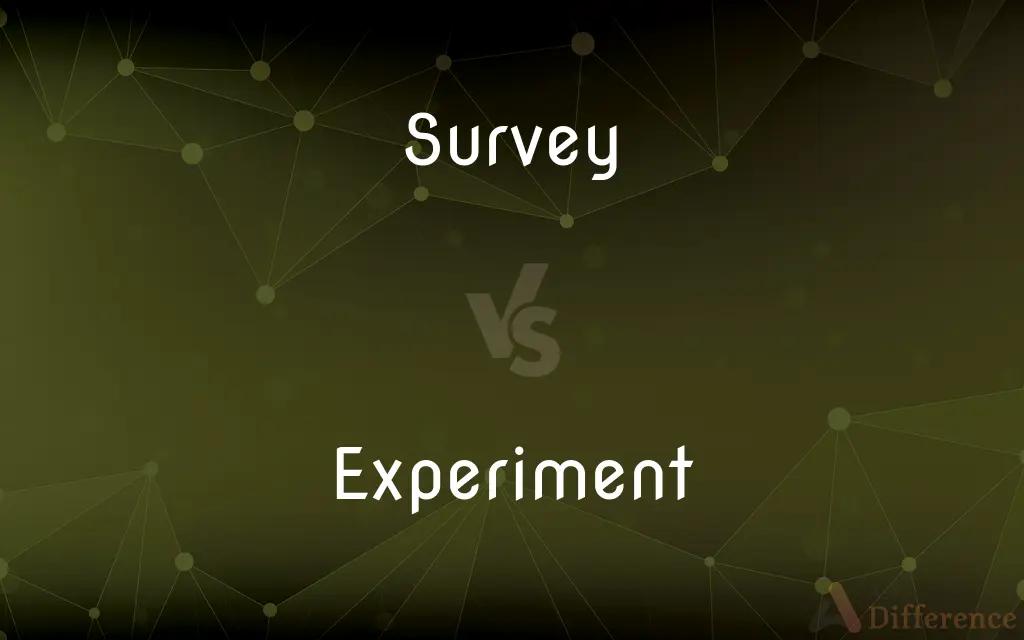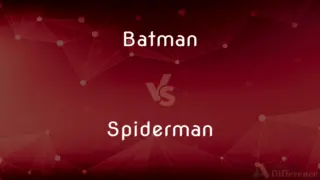Survey vs. Experiment — What's the Difference?
Edited by Tayyaba Rehman — By Maham Liaqat — Updated on April 1, 2024
Surveys gather opinions or observations across a wide audience, while experiments manipulate variables to observe effects, focusing on causality.

Difference Between Survey and Experiment
Table of Contents
ADVERTISEMENT
Key Differences
Surveys involve collecting data through questionnaires or interviews to understand opinions, behaviors, or characteristics of a group. On the other hand, experiments involve manipulating one or more variables to determine their effect on certain outcomes, providing a way to establish cause-and-effect relationships.
While surveys can reach a large number of participants quickly and at a lower cost, providing insights into attitudes and behaviors at a particular point in time, experiments require controlled environments to isolate variables, often making them more time-consuming and costly.
Surveys rely on self-reported data, which can introduce biases such as social desirability or recall bias. Experiments, however, control for these biases through random assignment and controlled conditions, aiming for objective measurement of outcomes.
The data collected from surveys is typically quantitative or qualitative, reflecting subjective experiences or preferences. Conversely, experimental data is quantitative, derived from controlled observations and measurements, allowing for statistical analysis to infer causality.
While surveys provide a broad overview of trends and correlations within a population, experiments allow researchers to infer causality by manipulating variables and observing the effects. This distinction makes experiments a more powerful tool for testing hypotheses about cause and effect.
ADVERTISEMENT
Comparison Chart
Purpose
To collect data on opinions, behaviors, or characteristics
To determine the cause-and-effect relationship between variables
Methodology
Collection of data through questionnaires or interviews
Manipulation of independent variables and observation of their effect on dependent variables
Data Type
Quantitative and/or qualitative
Primarily quantitative
Advantages
Broad reach, cost-effective, quick
Establishes causality, controls for biases
Limitations
Subject to biases, cannot establish causality
Time-consuming, costly, requires controlled conditions
Compare with Definitions
Survey
Can be conducted in person, by phone, or online.
Many political polls are conducted via telephone surveys.
Experiment
Can be conducted as field or lab experiments.
Field experiments in economics might test theories in real-world settings.
Survey
A method of gathering information from a sample of individuals.
A market research survey to understand consumer preferences.
Experiment
A research method involving variable manipulation to test hypotheses.
Experiments in psychology often test behavioral theories.
Survey
Targets a specific population or sample.
The survey targeted college students to understand their study habits.
Experiment
Uses random assignment to groups.
Participants are randomly assigned to control or experimental groups to ensure fairness.
Survey
Allows for anonymous responses.
Anonymity in health surveys helps in obtaining honest responses.
Experiment
Requires a controlled environment.
Laboratory experiments control for external factors.
Survey
Utilizes questionnaires or interviews.
Surveys on customer satisfaction are often conducted online.
Experiment
Involves both independent and dependent variables.
Testing the effect of sleep on memory involves manipulating sleep hours.
Survey
To look over the parts, features, or contents of; view broadly
Surveyed the neighborhood from a rooftop.
Surveyed the shelves in the pantry.
Experiment
An experiment is a procedure carried out to support or refute a hypothesis. Experiments provide insight into cause-and-effect by demonstrating what outcome occurs when a particular factor is manipulated.
Survey
To look at or examine carefully and appraise
Surveyed the storm damage. ].
Experiment
A test under controlled conditions that is made to demonstrate a known truth, examine the validity of a hypothesis, or determine the efficacy of something previously untried.
Survey
The act of surveying; a general view.
Experiment
The process of conducting such a test; experimentation.
Survey
A particular view; an examination, especially an official examination, of a particular group of items, in order to ascertain the condition, quantity, or quality.
A survey of the stores of a ship; a survey of roads and bridges; a survey of buildings.
Experiment
An innovative act or procedure
"Democracy is only an experiment in government" (William Ralph Inge).
Survey
The operation of finding the contour, dimensions, position, or other particulars of any part of the Earth's surface.
Experiment
The result of experimentation
"We are not [nature's] only experiment" (R. Buckminster Fuller).
Survey
A measured plan and description of any portion of country.
The owners of the adjoining plots had conflicting surveys.
Experiment
To conduct an experiment.
Survey
An examination of the opinions of a group of people.
The local council conducted a survey of its residents to help it decide whether to go ahead with the roadside waste collection service.
Experiment
To try something new, especially in order to gain experience
Experiment with new methods of teaching.
Survey
A questionnaire or similar instrument used for examining the opinions of a group of people.
I just filled out that survey on roadside waste pick-up.
Experiment
A test under controlled conditions made to either demonstrate a known truth, examine the validity of a hypothesis, or determine the efficacy or likelihood of something previously untried.
Conduct an experiment
Carry out some experiments
Perform a scientific experiment
Survey
(historical) An auction at which a farm is let for a lease for lives.
Experiment
(obsolete) Experience, practical familiarity with something.
Survey
(US) A district for the collection of customs under a particular officer.
Experiment
(intransitive) To conduct an experiment.
We're going to experiment on rats.
Survey
To inspect, or take a view of; to view with attention, as from a high place; to overlook
He stood on a hill, and surveyed the surrounding country.
Experiment
To experience; to feel; to perceive; to detect.
Survey
To view with a scrutinizing eye; to examine.
Experiment
To test or ascertain by experiment; to try out; to make an experiment on.
Survey
To examine with reference to condition, situation, value, etc.; to examine and ascertain the state of
It was his job to survey buildings in order to determine their value and risks.
Experiment
A trial or special observation, made to confirm or disprove something uncertain; esp., one under controlled conditions determined by the experimenter; an act or operation undertaken in order to discover some unknown principle or effect, or to test, establish, or illustrate some hypothesis, theory, or known truth; practical test; proof.
A political experiment can not be made in a laboratory, nor determined in a few hours.
Survey
To determine the form, extent, position, etc., of, as a tract of land, a coast, harbor, or the like, by means of linear and angular measurements, and the application of the principles of geometry and trigonometry
To survey land or a coast
Experiment
Experience.
Adam, by sad experiment I knowHow little weight my words with thee can find.
Survey
To examine and ascertain, as the boundaries and royalties of a manor, the tenure of the tenants, and the rent and value of the same.
Experiment
To make experiment; to operate by test or trial; - often with on, upon, or in, referring to the subject of an experiment; with, referring to the instrument; and by, referring to the means; as, to experiment upon electricity; he experimented in plowing with ponies, or by steam power.
Survey
To investigate the opinions, experiences, etc., of people by asking them questions; to conduct a survey; to administer a questionnaire.
Experiment
To try; to know, perceive, or prove, by trial or experience.
Survey
To inspect, or take a view of; to view with attention, as from a high place; to overlook; as, to stand on a hill, and survey the surrounding country.
Round he surveys and well might, where he stood,So high above.
Experiment
The act of conducting a controlled test or investigation
Survey
To view with a scrutinizing eye; to examine.
With such altered looks, . . . All pale and speechless, he surveyed me round.
Experiment
The testing of an idea;
It was an experiment in living
Not all experimentation is done in laboratories
Survey
To examine with reference to condition, situation, value, etc.; to examine and ascertain the state of; as, to survey a building in order to determine its value and exposure to loss by fire.
Experiment
A venture at something new or different;
As an experiment he decided to grow a beard
Survey
To determine the form, extent, position, etc., of, as a tract of land, a coast, harbor, or the like, by means of linear and angular measurments, and the application of the principles of geometry and trigonometry; as, to survey land or a coast.
Experiment
To conduct a test or investigation;
We are experimenting with the new drug in order to fight this disease
Survey
To examine and ascertain, as the boundaries and royalties of a manor, the tenure of the tenants, and the rent and value of the same.
Survey
The act of surveying; a general view, as from above.
Under his proud survey the city lies.
Survey
A particular view; an examination, especially an official examination, of all the parts or particulars of a thing, with a design to ascertain the condition, quantity, or quality; as, a survey of the stores of a ship; a survey of roads and bridges; a survey of buildings.
Survey
The operation of finding the contour, dimensions, position, or other particulars of, as any part of the earth's surface, whether land or water; also, a measured plan and description of any portion of country, or of a road or line through it.
Survey
A detailed critical inspection
Survey
Short descriptive summary (of events)
Survey
The act of looking or seeing or observing;
He tried to get a better view of it
His survey of the battlefield was limited
Survey
Consider in a comprehensive way;
He appraised the situation carefully before acting
Survey
Look over in a comprehensively, inspect;
He surveyed his new classmates
Survey
Keep under surveillance;
The police had been following him for weeks but they could not prove his involvement in the bombing
Survey
Hold a review (of troops)
Survey
Make a survey of; for statistical purposes
Survey
Plot a map of (land)
Common Curiosities
Why are experiments considered more reliable for testing hypotheses than surveys?
Experiments control for external variables and use random assignment, reducing biases and allowing for causal inferences.
What are the advantages of using surveys in research?
Surveys are cost-effective, can reach a wide audience quickly, and are versatile in collecting various types of data.
What is the main purpose of conducting a survey?
To gather information on opinions, behaviors, or characteristics from a specific population.
In what scenarios might a survey be preferred over an experiment?
When the research goal is to gather descriptive data on a wide range of behaviors, opinions, or demographics without the need to establish causality.
Can surveys determine cause-and-effect relationships?
No, surveys can indicate correlations but cannot establish causality due to the lack of variable manipulation.
What is a key limitation of experimental research?
It can be time-consuming and costly to set up controlled environments necessary for conducting experiments.
What type of data is primarily collected in surveys?
Both quantitative and qualitative data, depending on the survey design and questions asked.
How do researchers ensure the reliability of experimental results?
Through careful control of conditions, replication of studies, and use of random assignment to eliminate biases.
Is participant observation a part of surveys or experiments?
Participant observation is more common in qualitative research and surveys but can be part of experimental designs, especially in social sciences.
How does an experiment establish causality?
By manipulating one or more variables and observing the effects on other variables in a controlled setting.
What role does statistical analysis play in experiments?
Statistical analysis helps in interpreting the data collected from experiments, determining the significance of the results.
Can the results of surveys and experiments be generalized to the entire population?
Yes, but this depends on the sample size, selection methods, and whether the experimental conditions mimic real-life situations.
How can bias be minimized in survey research?
By using random sampling, ensuring anonymity, and carefully designing questions to avoid leading or biased wording.
How do surveys handle open-ended questions?
Open-ended questions in surveys allow respondents to provide detailed answers in their own words, which are then analyzed qualitatively.
What ethical considerations must be taken into account in experimental research?
Ensuring informed consent, minimizing harm to participants, and maintaining confidentiality of participant information.
Share Your Discovery

Previous Comparison
Batman vs. Spiderman
Next Comparison
Pyranometer vs. PyrheliometerAuthor Spotlight
Written by
Maham LiaqatEdited by
Tayyaba RehmanTayyaba Rehman is a distinguished writer, currently serving as a primary contributor to askdifference.com. As a researcher in semantics and etymology, Tayyaba's passion for the complexity of languages and their distinctions has found a perfect home on the platform. Tayyaba delves into the intricacies of language, distinguishing between commonly confused words and phrases, thereby providing clarity for readers worldwide.











































